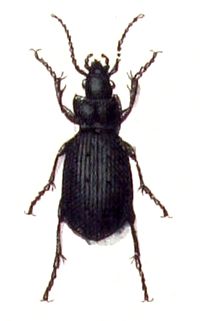
Photo from wikipedia
Metal pollution can drastically decrease the diversity of species of many groups of terrestrial invertebrates. Well-performed reclamation may prevent the loss of species diversity. In this study, we used multivariable… Click to show full abstract
Metal pollution can drastically decrease the diversity of species of many groups of terrestrial invertebrates. Well-performed reclamation may prevent the loss of species diversity. In this study, we used multivariable statistical methods to describe the species diversity of carabids and ants originating from two zinc-lead mine tailing ponds under different degrees of reclamation practices. Although the species diversity of carabids and ants in both study sites and in both seasons was relatively high, the investigated communities were dominated by one numerous species. Discriminant analysis indicated that the difference between study sites is due to the high number of carabid species found in the comprehensively reclaimed site and the high abundance of several species of ants found in the partially reclaimed site. The most striking difference in species composition between the study sites was the contribution of forest species. The comprehensively reclaimed site maintains more species of forest carabids but fewer forest species of ants in comparison to the partially reclaimed one.
Journal Title: Polish Journal of Environmental Studies
Year Published: 2018
Link to full text (if available)
Share on Social Media: Sign Up to like & get
recommendations!